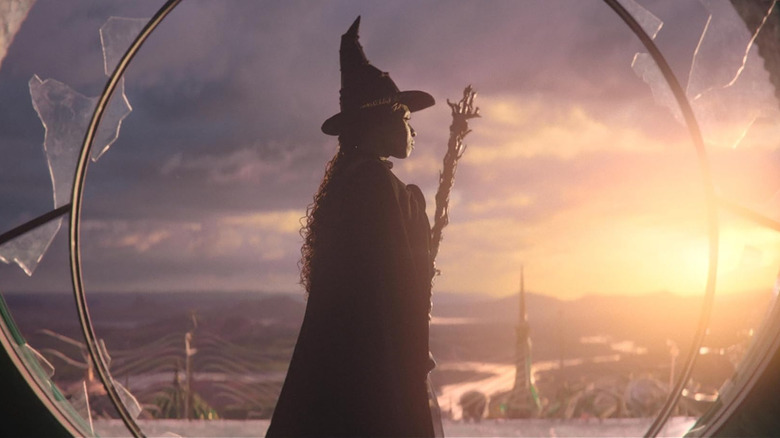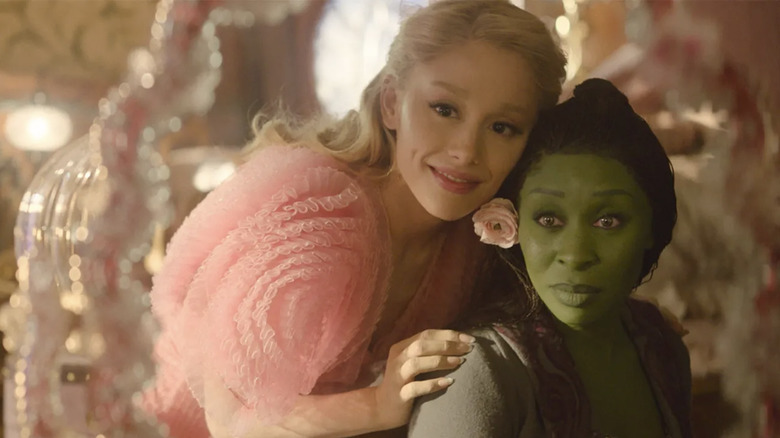The Decision To Split Wicked Into Two Movies Is Good, Actually
Years ago, Elric Kane, film director and co-host of the Colors of the Dark podcast, was on a podcast talking about his at-the-time film students' feelings about movie lengths when one of his students said something that I've been thinking about for the better part of a decade: "The first 90 minutes are free, but you gotta earn every minute after that." The idea is that the average moviegoer has the attention span and dedication for an hour-and-a-half-long movie, but if you stretch beyond those 90 minutes, you have to make them count.
For the most part ... I tend to agree with that sentiment. I love a long movie (shout out to "RRR"), but there's nothing worse than a bloated movie that feels like it's overstaying its welcome. "Dune Part Two" director Denis Villeneuve fired back at people who critiqued his sci-fi epic's two-hour and 46-minute runtime, but "Dune Part Two" is critically acclaimed and made over $714 million at the box office. It's not like he needed to do much defending. However, Martin Scorsese's masterful "Killers of the Flower Moon" stretched nearly three and a half hours, and absolutely did need defending after a disappointing run at the box office (though it fortunately recouped its box office losses when it hit video on demand).
And then there's a movie like "Wicked" which, despite being based on a stage musical that runs two hours and 45 minutes long, including a 15-minute intermission, is being split into two films with each film expected to be somewhere in the same ballpark. "Wicked Part One," which covers Act I of the stage show, runs two hours and 41 minutes. "Part Two" will likely be shorter, but even if the movie comes in at, say, two hours, we're talking about roughly five hours of movie. Having seen "Wicked Part One" and being a big enough fan of the Broadway show to know what lies ahead, I'll be brave enough to say it — splitting "Wicked" into two movies was the right call.
The trouble with translating Wicked from stage to screen
Musical theater does not follow a similar structure to cinema, which is why despite being one of the biggest musicals of the last 25 years, some viewers were overwhelmed by the live stage recording of Lin-Manuel Miranda's "Hamilton." Theatre is in constant dialogue with the live audience, while film is more presentational. There's a greater sense of suspension of disbelief with a stage production because the audience has already bought in and knows what to expect, so rapidly evolving character arcs and a song being used in place of cleverly placed exposition are accepted without question. Back in the '50s and '60s, movie musicals like "West Side Story," "The Sound of Music," and "My Fair Lady" were structured to include an intermission, a way to both honor the movies' Broadway roots as well as justify the longer runtime.
If a film adaptation moved at the same breakneck pace as a musical, it wouldn't translate as well, so a little extra time is a good thing. In the case of "Wicked," the split is necessary on multiple levels. For one, the extra run-time allows Cynthia Erivo and Ariana Grande's performances as Elphaba and Galinda (later, Glinda) to breathe, and their journey from loathing one another to becoming dear friends is a lot more believable and less reliant on the convenience of musical theatre trappings. Not to mention, Act I of "Wicked' ends with the show-stopping, curtain-dropping number "Defying Gravity," a song that was practically invented to tear the house down so audiences would feel energized right before intermission. In fact, songwriter Stephen Schwartz cited "Defying Gravity" in his defense of "Wicked" being split into two films. "We found it very difficult to get past 'Defying Gravity' without a break," he explained. "That song is written specifically to bring a curtain down, and whatever scene to follow it without a break just seemed hugely anti-climactic."
Schwartz is right. "Defying Gravity" isn't just the best song in "Wicked," it's also one of the best belt solo numbers in musical theatre history. Audiences need to step away from the story after that moment because it's an impossible act to follow. It's one of the things I struggle with the most in Bill Condon's adaptation of "Dreamgirls." Simply moving on after Jennifer Hudson belts out "And I Am Telling You I'm Not Going" feels like tonal whiplash, and that's not even the last song of Act I on stage!
Wicked is a musical epic and should be treated as such
"The Wizard of Oz" is a beloved cinematic classic, but anyone who has read L. Frank Baum's original book knows that the movie is severely lacking in the lore (including the Tin Woodsman killing a pack of wolves, the Scarecrow snapping the necks of a bunch of crows, and the Cowardly Lion killing a giant spider). The "Wicked" stage musical poses a similar challenge; it's not just a prequel to "The Wizard of Oz" but also a story about female friendship, discrimination, governmental corruption, and how quickly propaganda spreads. These are heady topics, and translating the narrative from stage to screen without it feeling rushed would likely mean sacrificing some really important moments.
Jon M. Chu's adaptation of Lin-Manuel Miranda's "In The Heights" was met with critical acclaim (box office judgment isn't fair as the quarantine era of the pandemic was still happening), but even at two hours and 31 minutes, some of the best moments of the stage musical were cut out for time. For instance, the song "Everything I Know" as performed by Nina, is a heartbreaking song of mourning after the passing of Abuela Claudia that is one of the high points of Act II. It was completely omitted from the film, which not only changed the reason for the character's arc shift but denied actor Leslie Grace a show-stopping number that would have potentially made her one of the highlights of the entire movie (and who knows, maybe that added notoriety would have prevented "Batgirl" from getting the ax).
The "Wicked" stage musical already left a lot of the most important moments of Gregory Maguire's book of the same name when adapting it to the stage, so losing even more of that story in a film adaptation would be a tragedy. If anything, I can only hope that Jon M. Chu and company added things back in for the films to feel like a more complete adaptation. However, as it stands, splitting the film into two parts feels like the right call. That said, making me wait a whole year for "Wicked: Part Two" ... now that's a whole 'nother story.
"Wicked" is now playing in theaters.


